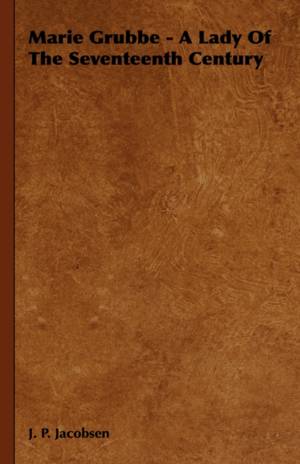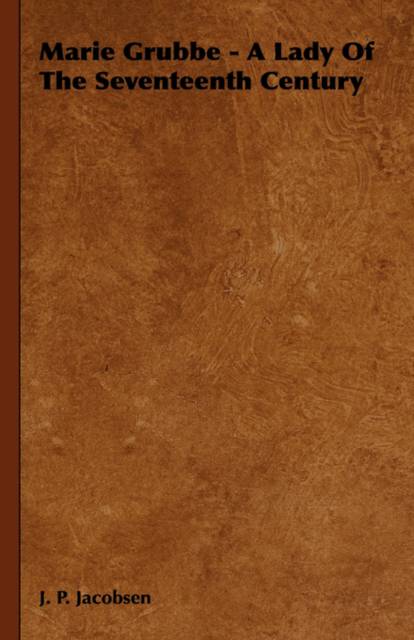
- Afhalen na 1 uur in een winkel met voorraad
- Gratis thuislevering in België vanaf € 30
- Ruim aanbod met 7 miljoen producten
- Afhalen na 1 uur in een winkel met voorraad
- Gratis thuislevering in België vanaf € 30
- Ruim aanbod met 7 miljoen producten
Zoeken
€ 56,95
+ 113 punten
Uitvoering
Omschrijving
MARIE GKUBBE A LADY OF THE SEVENTEENTH CENTURY by J. P. JACOBSEN. Originally published in 1917. INTRODUCTION: LANGUAGE is like an instrument that requires to be 1 v tuned occasionally. A few times in the course of a century the literary language of a country needs to be tuned afresh for as no generation can be satisfied to think the thoughts of the preceding one, so no group of men in the world of letters can use the language of the school that went before them. With these words Georg Brandes begins his discussion 1 of the influence of J. P. Jacobsen, As Brandes himself was the critic who found new paths, Jacobsen was the creative artist who moulded his native language into a medium fit for modern ideas. At the time when Denmark and Norway had come to a parting of ways intellectually, and the great Norwegians were forming their own rugged style, Jacobsen gave the Danes a language suited to their needs, subtle, pliant, and finely modulated. He found new methods of approach to truth and even a new manner of seeing nature and humanity. In an age that had wearied of generalities, he emphasized the unique and the character istic. To a generation that had ceased to accept anything because it was accepted before, he brought the new power of scientific observation in the domain of the mind and spirit. In order to understand him it is necessary to follow the two currents, the one poetic, the other scientific, that ran through his life. Jens Peter Jacobsen was born in Jutland, in the little town of Thisted, on April 7, 1847, an was son a merchant in moderate circumstances. From his mother he inherited a desire to write poetry, which asserted itself while he was yet a boy. His other chief interest was botany, 1 Det moderne Genncmbruds then a new feature of the school curriculum. He had a fer vent love of all plant-life and enjoyed keenly the fairy-tales of Hans Christian Andersen, in which flowers are endowed with personality. At twenty, Jacobsen wrote in his diary that he did not know whether to choose science or poetry for his life-work, since he felt equally drawn to both. He added If I could bring into the realm of poetry the eter nal laws of nature, its glories, its riddles, its miracles, then I feel that my work would be more than ordinary. He was one of the first in Scandinavia to realize the im portance of Darwin, and translated The Origin of Species and The Descent of Man, besides writing magazine articles elucidating the principles of evolution. Meanwhile he car ried on his botanical research faithfully and, in 1872, won a gold medal in the University at Copenhagen for a thesis on the Danish desmidiactae, a microscopic plant growing in the marshes. In the same year, he made his literary debut with a short story, Mogens, which compelled attention by the daring originality of its style. From that time on, he seems to have had no doubt that his life-work was litera ture, though he became primarily a master of prose and not, as he had dreamed in his boyhood, a writer of verse. In the spring of 1873, e wrote fr m Copenhagen to Edvard Brandes 1 Just think, I get up every morning at eleven and go to the Royal Library, where I read old docu ments and letters and lies and descriptions of murder, adul tery, corn rates, whoremongery, market prices, gardening, the siege of Copenhagen, divorce proceedings, christenings, estate registers, genealogies, and funeral sermons. All this is to become a wonderful novel to be called Mistress Marie Grubbe, Interiors from the Seventeenth Century. J. P. Jacobsen. Med Forord udgivne af Edvard Brandes. INTRODUCTION vii You remember, she is the one who is mentioned in Hoi bergs Epistles and in The Goose Girl by Andersen, and who was first married to U. F...
Specificaties
Betrokkenen
- Auteur(s):
- Uitgeverij:
Inhoud
- Aantal bladzijden:
- 288
- Taal:
- Engels
Eigenschappen
- Productcode (EAN):
- 9781443725088
- Verschijningsdatum:
- 4/11/2008
- Uitvoering:
- Hardcover
- Formaat:
- Genaaid
- Afmetingen:
- 140 mm x 216 mm
- Gewicht:
- 512 g

Alleen bij Standaard Boekhandel
+ 113 punten op je klantenkaart van Standaard Boekhandel
Beoordelingen
We publiceren alleen reviews die voldoen aan de voorwaarden voor reviews. Bekijk onze voorwaarden voor reviews.











